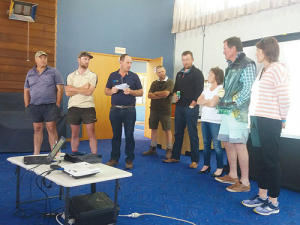It will link five target farms in a cluster with mentor farmers and consultants to look at improving production, profits and environmental performance over three years.
Five associate farmers will be linked to each target farmer. They will apply the target farmer’s learnings to their own farm.
Eventually 10 clusters will have been formed, involving 350 Northland farms.
Extension 350 chairman Ken Hames says target and mentor farmers are now sought for four clusters starting next year.
Two sheep and beef clusters will kick off, one in the Helensville to Wellsford area and another in the mid north. Two dairy clusters will also start next year, one in the Far North around Kaitaia and one in the Ruawai region.
Hames and Beef + Lamb NZ northern North Island extension officer Alison Whiteford held a workshop briefing in Wellsford recently.
Extension 350 is about farmers learning from farmers, says Hames.
“Extension 350’s objective is to raise the onfarm productivity and profitability of Northland farming businesses,” he says.
“It is also aiming to improve environmental sustainability and build those changes into farming operations.
“We want to strengthen farmer networks and lift farmer interactions between themselves to build a sense of community.
“We are also targeting getting Maori farmers and Maori farming corporations. There is a big one in Northland in the sheep and beef cluster that shows huge potential.”
The set-up phase was up to June 1 this year. They hired a project manager and consultants and put systems in place, Hames explained.
One sheep and beef cluster is already underway in the Far North as are two dairy clusters, north and south of Whangarei.
Planning is underway for year two, which officially starts on June 1, 2018, but preparatory work is needed for the two sheep and beef and two dairy clusters starting.
After mentor and target farmers are in place, a call for associate farmers will be made in the new year.
Hames says the target farmer needs to be a ‘middle of the road’ type. The mentor farmer will help him improve his productivity and profitability. A consultant will work with both to achieve the target farmer’s goals and objectives.
The five associate farmers will watch and learn from the target farmers’ journey. Hames says an extra mentor farmer may be brought in on specific issues.
The model and funding is all based on five teams per cluster so they need to ensure they achieve that to maximise the funding involved.
The cluster stays together for three years.
The target farms for the clusters starting next year will get a whole-farm assessment early in the new year. On June 1 the clusters will formally start.
Whiteford says the whole farm assessment is very involved, e.g. governance and business structure, through every aspect including animal welfare, environmental, personal goals and succession planning, etc.
Consultants must be certified and must meet a very high standard.
Whiteford says current funding only allows for a farm assessment of the target farms. The onfarm assessment costs $3000-$4000.
Hames says the project is funded through four to five different sources: MBIE is contributing 60% of the funding, about $1.4m; Northland Inc $832,000; DairyNZ $600,000; and BLNZ $200,000.
Each target farmer’s contribution averages about $2000 a year – $6000 over the three years. It is arranged to be more lightly loaded at the beginning of the project. The first year’s contribution can be about $1000.
Hames says this ensures some “buy in or commitment” by the target farmers and they might boost profits by $20,000-$30,000 or more.
“Hopefully they should get 10 times the return out of that investment.”
The target farmer will sit down and talk about what they want to achieve; every farm will be different.
“We will work with you to identify opportunities to improve profitability, productivity and environmental sustainability,” says Hames.
As well as the comprehensive whole farm assessment, target farmers are paired with a mentor who will be a good farmer in the region. They also need good communications skills to transfer information.
A consultant will make eight visits in the first year with advice paid for under the project. There is also farm business training involved – setting KPIs, benchmarking, budgeting, risks, etc. The clusters also provide excellent networking opportunities.
The five associate farmers linked to each target farm will learn from their experience. It is expected associate farmers will lift their profitability by at least 20% of what the target farmer achieves. They will be benchmarked, but lightly.
The mentor farmer’s role is a chance to give back; it is not a paid role.
“One of the great things about farming is farmers are willing to give back and help other people.”
Hames has asked the farmers to get in behind the project.
“I have seen it work in the dairy sector – farmers learning off farmers,” he says. He gave an example of a DairyNZ partner farm in the Far North where mature farmers had boosted annual profits by $180,000 through a similar scheme of farmers helping farmers.
“When you improve profitability and have got cash, you can take your kids on holiday, pay off debt, do more environmental stuff which is looming or make changes on farm.”
After three months under the project
- Whole farm assessment
- Follow up visit to discussion recommendations
- Model farm in Farmax
- Cash Manager Rural group training day followed by one on one training
- Contact with other like-minded farmers
- Two day course on farm business training covering things such as strategic planning, setting KPIs, benchmarking, budgeting, risk analysis, apps and programmes available to help participants to the above.
• Anyone interested in being a mentor or target farmer in any of the areas should contact Luke Beehre, Extension 350 project manager, 027 544 7839.

















